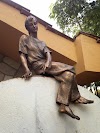I am grateful to Fr David Neuhaus SJ for sharing with me his latest article.
May these stories encourage our prayer for peace on October 7 and beyond.
May these stories encourage our prayer for peace on October 7 and beyond.
Why am I still praying?
David Neuhaus SJ
David Neuhaus SJ
A year has passed and the horror continues. It has spread from Gaza and southern Israel to the West Bank and to Lebanon and northern Israel. It has engulfed the entire region. Syria, Iraq, Iran and Yemen are burning too. So many dead and wounded. So many homeless and hungry. So many hopeless and lost. So much destruction. The hate, the rage and the interminable desire for revenge are still unsated.
And I am still praying. Why? Is God listening? My prayer is often simply a struggle to find words that can still plot out a horizon of hope amid the despair. I search for words of faith, words that express to God dreams of justice and peace, liberty and equality for all, rather than screams of rage, groans of disgust and the sullen silence of depression. In this task, I seek help from those I hold in my mind, those that speak to me of my world plunged in darkness.
On October 23, 84-year-old Yocheved Lifshitz was released from Hamas captivity in Gaza, having been taken hostage on October 7 together with about 250 others. Since then, she has been one of the voices calling for the release of those still in captivity. Her face represents the suffering of the hostages, the anguish of their families who do not know whether their loved ones are alive or dead, and the trauma of those who were released and try to rebuild their lives. As she left captivity, she turned and shook hands with one of her captors. Recently she explained this act, which many Israelis found incomprehensible. He had said to her, “We are sick and tired of fighting, let the peoples speak to one another.” In an interview published on September 24, she said, “Why would I not shake a hand that is extended to me.” In the same interview, she recalled her meetings with both Yahya Sinwar, Hamas chief, in Gaza, and with Binyamin Netanyahu, after her release. She accused both of “seeking only to stay in power”.
On November 14, an Israeli armored car in Gaza ran over the body of 84-year-old Elham Farah, a beloved music teacher, a devout Christian. She had been sheltering in the Catholic church of the Holy Family. She strode out of the church in order to see what had happened to her home and was shot by a sniper. She lay bleeding in the street for hours. Nobody dared to pull her to safety. A recent photo shows her radiant face.
“If I must die, you must live to tell my story.” These are the first words of the last poem written by Gazan Refaat Alareer, 44-year-old professor of English literature, killed in an Israeli bombardment on December 6. He died alongside other members of his family. A few weeks later his daughter and grandchild were also killed. He is present each day in my prayer, representing the hundreds of intellectuals, academics, artists killed – the very people who could open the horizons beyond death and destruction.
On April 7, Layan Nasir, a 23-year-old Christian student from Bir Zeit in the West Bank was dragged from her home and placed in administrative detention. She is defined as a security threat to the state of Israel because of her student activism. More than 3500 Palestinians are held in administrative detention, including tens of women and adolescents.
On August 13, Muhammad Abu al-Qumsan, from Deir al-Balah in Gaza, went to register the birth of his twin babies, Aysar and Asal. Returning with the registration certificates, he found his home destroyed, his wife Joumana, a pharmacist, and the twins dead. His image, distraught in his grief, is engraved in my memory, representing parents and hundreds of newborns and other children among the tens of thousands of dead in the Gaza Strip.
On August 31, the Israeli army discovered the bodies of six hostages in a tunnel in Rafah. They had been executed. One of the six was Hersh Goldberg-Polin. In my neighborhood in Jerusalem, his face was well-known, smiling out from posters plastered everywhere. And now he too was dead. His mother, Rachel, had travelled the world to call for his release and that of all the hostages. Her eulogy for her son rings in my ears daily.
As we transform our hope into grief and this new unknown brand of pain, I beg of you, please do what you can to have your light shine down on me (…) Help shower us with healing and resilience. Help us to rise again.
On September 18, Jewish Jerusalemite Veronika Cohen, a musicologist and beloved friend, celebrated her eightieth birthday. Born in the Budapest ghetto, she and her parents survived against all odds. She wanted to give thanks for the miraculous gift of life. She invited her friends to join her outside Newe Tirza Prison in Ramleh, central Israel, to protest the conditions in which Khalida Jarrar, a Palestinian political activist from Ramallah was being held. Khalida, 61 years old, is held without charges since December. She is confined in a windowless, suffocating cell. Having lost two of her children, most recently her son Wadie, she was denied permission to attend their funerals. The faces of Veronika and Khalida accompany me in my attempts to pray.
And there are many more that come to mind… Palestinians, Israelis, Lebanese, children, women and men caught up in a grinding machinery of death as the world looks on, mouthing empty slogans and pious wishes. And I continue to pray. Most of it is lamentation and raging at the heavens. And with the heavenly choir, I call out, “How long will it be?” (Revelation 6:10).







